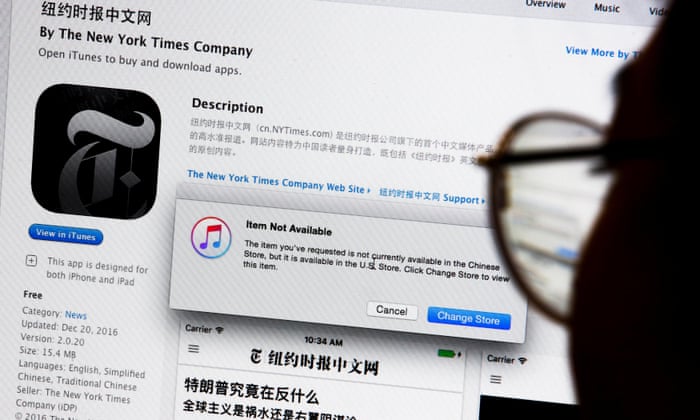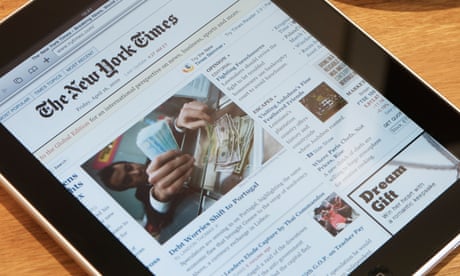Apple is not the only tech company kowtowing to China’s despots.
There is rightly outrage at Apple removing the New York Times app from its Chinese store.
Now let’s take a look at LinkedIn, Evernote and Microsoft.
There is rightly outrage at Apple removing the New York Times app from its Chinese store.
Now let’s take a look at LinkedIn, Evernote and Microsoft.
By Melissa Chan

‘One online advocacy organization labelled Apple the “world leader in globalizing Chinese censorship”.’

‘One online advocacy organization labelled Apple the “world leader in globalizing Chinese censorship”.’
News of Apple pulling the New York Times app from its store in China has been met with the expected outrage on social media.
One online advocacy organisation labelled Apple the “world leader in globalising Chinese censorship”.
Tom Grundy of Hong Kong Free Press, an independent online news outlet, tweeted that Apple was now “eagerly assisting” in censorship.
And the New York Times’s own correspondent, Chris Buckley, asked on Twitter whether Apple owed an explanation to the paper’s Chinese readers.
I have experience with Chinese censorship, as both target and witness of it.
As a reporter there for five years, I – along with the rest of the foreign press corps – often faced attempts at both the local and national level to interfere with and stop our coverage.
And as someone who happened to be in China when social media and cloud-based technology started taking off, I also wrote many stories on China’s moves to block Facebook, Twitter and Google. Here’s a list of major websites blocked in the country.
As much as I have spoken up against Chinese censorship, and as often as I berate Mark Zuckerberg’s blatant kowtowing in order to get Facebook back into China, I actually think we should hold some of our fire, or at least stop short of singling Apple out as the worst offender.
I say this as someone who has also covered Silicon Valley as a Bay Area-based correspondent.
In the United States, Apple has a strong track record as an industry leader against government attempts to access users’ data.
It has butted heads directly with the Obama administration over issues of privacy and security, calling it a fight for civil liberties.
It has taken unpopular positions, including refusing to cooperate with the FBI to help agents read the encrypted data from domestic terrorist Syed Farook’s iPhone.
This is a technology company that has appeared to have at least tried, at times, to do the right thing.
Of course, Apple has not manufactured iPhones in China without scandal.
From stories of factory workers being made ill by the chemicals used to make iPhone touch screens, to a spate of suicides at a manufacturer’s campuses, Apple’s record is checkered.
Apple only shoulders responsibility when it also happens to improve the company’s bottom line, or when it’s easy.
In the United States, Apple has recourse to a functioning legal system to launch its battles.
In China, where the rule of law is weak, it means a much tougher environment and far fewer options when the company disagrees with government decisions.
The situation is complicated by the tremendous leverage the Chinese government has over Apple.
Not only is the iPhone manufactured there, but sales of Apple products in China account for a quarter of its global revenue.
Apple has not explained its latest decision and which law the New York Times fallen foul to.
The newspaper has a Chinese-language edition of its paper.
In 2012, Beijing blocked both the Chinese and English-language websites, but readers could continue reading articles if they downloaded the apps to their iPhones.
Now, Apple has removed both English and Chinese-language apps from its store, making it impossible to read the New York Times unless users know how to employ circumvention tools.
Maybe the larger the company, the more scrutiny it should receive.
In that spirit, Apple’s decision to pull the apps deserves full moral fury.
But keep in mind that every single US tech company in China makes compromises in order to enter the market.
LinkedIn restricts its content.
Evernote, like Apple, stores Chinese account holders’ data on Chinese servers so that authorities may access the information.
Microsoft censors.
None of this is right.

Tom Grundy of Hong Kong Free Press, an independent online news outlet, tweeted that Apple was now “eagerly assisting” in censorship.
Few foreign companies have taken the moral stand that Google did by exiting China.
I remember when the company made that decision.
Supporters of a more open China dropped off flowers outside its Beijing offices, excited that it had made such a bold move.
But if anybody had hoped Google’s defection would launch an exodus, it never happened.
Since then, Chinese censorship and attempts to control foreign companies have only become more odious, with no indication it will let up.
Apple’s problem today, is another foreign company’s conundrum tomorrow.
Its dependance on China serves as a case study for how the story will repeatedly, dismally play out. All this stops only when the financial incentives to do business in China, and with China, disappear.
Aucun commentaire:
Enregistrer un commentaire